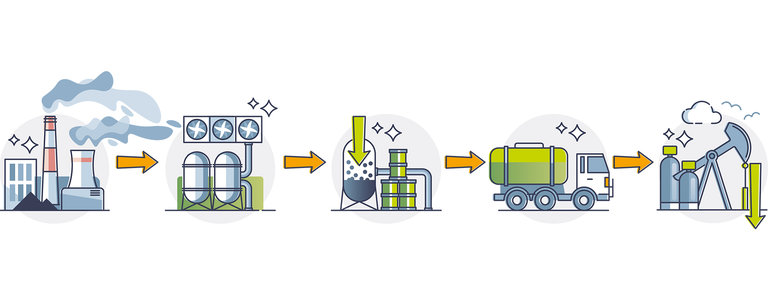
Study: Nearly 200 commercial CCS projects worlwide
The number of CCS projects around the world is increasing substantially, and the pace of growth is expected to accelerate even further. This is because CCS technology is being promoted in an increasing number of countries. These are the findings of the Global CCS Institute’s most recent market analysis.
Interest in CCS technology has picked up around the globe. The Global CCS Institute, a climate think tank, lists a total of 196 commercial CCS plants in its “Global Status of CCS 2022” study. Of that number, 30 projects are already in operation, 11 are under construction and 153 are under development. 61 new facilities have been added to the project pipeline in 2022. Overall, this has brought the carbon capture capacity of all CCS plants under development to 244 million metric tons per year (MTPA). This represents an impressive 44 percent increase in the past 12 months.
The Global CCS Institute’s CEO Jarad Daniels expects the pace of growth in CCS project development and implementation to increase further as countries and companies work to achieve their climate commitments. “The latest, most credible scientific analysis from organizations including the Intergovernmental Panel on Climate Change (IPCC) and the International Energy Agency (IEA), highlights that reaching our climate goals is practically impossible without CCS,” says Daniels. “Many essential industries like cement and chemical production have
no other viable path for deep decarbonization other than CCS.”
CCS is becoming increasingly competitive
As CCS continues to scale-up, we are also seeing savings in cost and efficiency of deployment. “Thanks in part to strengthening government policies around the world, CCS is increasingly commercially competitive across the entire value chain, from capture technologies through to storage”, explains Daniels. “We anticipate even more strategic partnerships and collaboration driving deployment, particularly through CCS networks.”
Despite the growing importance of CCS, Daniels believes global efforts to reduce emissions remain insufficient: “Government policy must be met with private capital to unlock the full potential of CCS and limit global warming to 1.5 degrees to avoid the most catastrophic impacts of climate change. Though CCS deployment is scaling rapidly, we need to see an increase by at least a factor of 100 if we are to achieve the Paris climate goals.”
Key results of the “Global Status of CCS 2022” study:
- In 2022, there are 30 commercially operating CCS facilities, 11 facilities in construction and 153 in various stages of development.
- The capture capacity of CCS projects in the project pipeline is 244 million tons per annum (MTPA) – an increase from 169 MTPA in 2021.
- In the USA, taxes on CCS projects have been reduced. Initial analyses suggest that this could lead to a 13-fold increase in CCS deployment by 2030.
- Canada continues to pursue CCS as part of broader decarbonization, with the 2022 federal budget including a CCUS tax credit and a CCUS strategy currently under development.
- In Europe, the Danish Government has committed €5 billion for CCS over 10 years, the Dutch Government has more than doubled the SDE++ program since its launch to €13 billion. Several countries in Europe, including Poland, Bulgaria, and Finland, are entering the CCS market for the first time due to the EU Innovation Fund’s subsidy program.
- In the Asia Pacific region, Thailand announced its first CCS project, China’s first million tonne project commenced operations and Australia saw new project announcements in Victoria and Western Australia as well as notable progress in the Northern Territory.

The Global CCS Institute
The Global CCS Institute is an international think tank whose mission is to accelerate the deployment of CCS technology. The institute’s international membership includes governments, global corporations, private companies, research bodies and non-governmental organizations. With a team of professionals working with and on behalf of the its members, the Global CCS Institute drives the sharing expertise, building capacity and providing advice and support. The institute is headquartered in Melbourne. The institute also has offices in Washington, Brussels, Beijing, London, Tokyo and Abu Dhabi.
